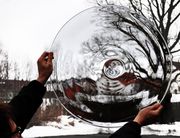Difference between revisions of "Crown glass"
m (Text replace - "== Authority ==" to "== Sources Checked for Data in Record ==") |
|||
| (5 intermediate revisions by the same user not shown) | |||
| Line 1: | Line 1: | ||
| + | [[File:Crown-Bullion-bullseye-glass.jpg|thumb|Handmade Crown Glass<br>Bendheim.com]] | ||
== Description == | == Description == | ||
1) A hard, clear optical glass made of soda-lime. Crown glass has a low dispersion and a low refractive index. | 1) A hard, clear optical glass made of soda-lime. Crown glass has a low dispersion and a low refractive index. | ||
| − | 2) An old form of window glass produced by spinning a globe of glass to form a thin, flat circle. The flattened sheet had a thicker raised center that was called a crown or bull's eye. Crown glass | + | 2) An old form of window glass produced by spinning a globe of glass to form a thin, flat circle. The flattened sheet had a thicker raised center from the glassmaker's rod that was called a crown or bull's eye. The process may have been Syrian in origin. It was used in Europe since at least the 14th century. Crown glass made in Normandy region of France was considered to be a high quality glass. It was typically a light blue or green color with a bright fire-polished finish. Circles were made with diameters up to 1.2 meters (44 inches). They were cut into smaller rectangular pieces for use. The glass retains concentric ripple lines from the spinning process. |
== Synonyms and Related Terms == | == Synonyms and Related Terms == | ||
| Line 9: | Line 10: | ||
2: verre en plats (Fr.); vidro de coroa ou prato (Port.); Normandy glass; bull's eye glass | 2: verre en plats (Fr.); vidro de coroa ou prato (Port.); Normandy glass; bull's eye glass | ||
| − | == | + | == Resources and Citations == |
* G.S.Brady, ''Materials Handbook'', McGraw-Hill Book Co., New York, 1971 Comment: p. 361 | * G.S.Brady, ''Materials Handbook'', McGraw-Hill Book Co., New York, 1971 Comment: p. 361 | ||
| Line 17: | Line 18: | ||
* ''Dictionary of Building Preservation'', Ward Bucher, ed., John Wiley & Sons, Inc., New York City, 1996 | * ''Dictionary of Building Preservation'', Ward Bucher, ed., John Wiley & Sons, Inc., New York City, 1996 | ||
| − | * | + | * G.Allen, L.Black,K.Hallam, "A Preliminary Investigation into the Effect of Self-Adhesive Ultraviolet Absorbing Films on Window Glass" in ICOM preprints Lyon, 1999. p.757-763; EU dictionary |
| + | * Encyclopedia Britannica: https://www.britannica.com/technology/crown-glass | ||
[[Category:Materials database]] | [[Category:Materials database]] | ||
Latest revision as of 11:01, 25 August 2020
Description
1) A hard, clear optical glass made of soda-lime. Crown glass has a low dispersion and a low refractive index.
2) An old form of window glass produced by spinning a globe of glass to form a thin, flat circle. The flattened sheet had a thicker raised center from the glassmaker's rod that was called a crown or bull's eye. The process may have been Syrian in origin. It was used in Europe since at least the 14th century. Crown glass made in Normandy region of France was considered to be a high quality glass. It was typically a light blue or green color with a bright fire-polished finish. Circles were made with diameters up to 1.2 meters (44 inches). They were cut into smaller rectangular pieces for use. The glass retains concentric ripple lines from the spinning process.
Synonyms and Related Terms
2: verre en plats (Fr.); vidro de coroa ou prato (Port.); Normandy glass; bull's eye glass
Resources and Citations
- G.S.Brady, Materials Handbook, McGraw-Hill Book Co., New York, 1971 Comment: p. 361
- Walter C. McCrone, John Gustave Delly, The Particle Atlas, W. McCrone Associates, Chicago, IV, 1972
- Dictionary of Building Preservation, Ward Bucher, ed., John Wiley & Sons, Inc., New York City, 1996
- G.Allen, L.Black,K.Hallam, "A Preliminary Investigation into the Effect of Self-Adhesive Ultraviolet Absorbing Films on Window Glass" in ICOM preprints Lyon, 1999. p.757-763; EU dictionary
- Encyclopedia Britannica: https://www.britannica.com/technology/crown-glass
